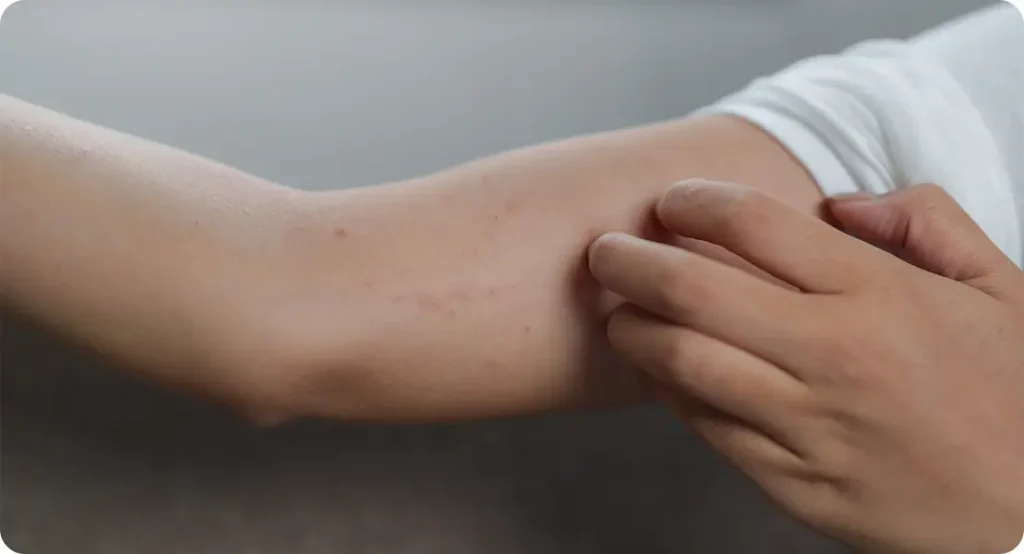Night-time itching can be both disruptive and frustrating, often making it difficult to get a restful night’s sleep. Many people notice that even if their skin feels relatively fine during the day, the itchiness tends to intensify once they’re in bed. This phenomenon, known as nocturnal pruritus, is surprisingly common and can occur even when no new irritants or obvious triggers are present.
The reasons for increased night-time itching are varied and can be influenced by a combination of biological, environmental, and lifestyle factors. For some individuals, underlying skin conditions such as eczema, psoriasis, or allergic dermatitis may be to blame. For others, environmental factors like low humidity, central heating, or dry bedding materials can worsen skin dryness, leading to itchiness.
Physiologically, our skin’s barrier function and sensitivity change over the course of the day due to natural circadian rhythms. At night, body temperature rises slightly, and the skin loses more moisture, which can make it feel drier and more prone to irritation. Additionally, the body produces fewer anti-inflammatory hormones in the evening, meaning that any underlying irritation can feel more intense.
Other contributing factors include stress, certain medications, insect bites, or underlying systemic conditions such as liver or kidney disease. Even the simple act of lying still in a quiet environment can make you more aware of sensations that you might ignore or overlook during the day.
In this article, we’ll take a closer look at the most common causes of nocturnal itching, the science behind why it tends to worsen at night, and the steps dermatologists recommend to help soothe the skin, improve comfort, and ensure you get lasting relief.
1. Why Does Skin Itch More at Night?
The experience of skin itching more intensely at night known medically as nocturnal pruritus is surprisingly common and can be frustrating for those who struggle to get a good night’s rest because of it. What makes this phenomenon interesting is that, in many cases, the skin may appear normal during the day, yet once evening comes, the itch becomes harder to ignore. This isn’t just in your imagination; there are biological, environmental, and behavioural factors at play that can explain why itchiness tends to feel worse after dark.
Key Reasons for Night-time Itching
1. Reduced Distractions and Heightened Awareness
Our perception of sensations is heavily influenced by what we’re doing. In the daytime, most people are distracted by work, conversations, errands, or entertainment. These constant mental engagements help mask minor discomforts. At night, however, when the lights are low and the environment is calm, there are fewer external distractions, and the brain naturally becomes more aware of internal sensations such as an itch.
When you lie still in bed, any tingling, dryness, or irritation that might have gone unnoticed earlier can suddenly feel more pronounced. This heightened awareness makes even mild itching seem more intense, which is why it can be harder to ignore at night.
2. Natural Changes in Skin Temperature and Moisture Levels
Our skin and body temperature fluctuate according to the body’s circadian rhythm, the internal clock that regulates various biological processes over a 24-hour cycle. In the evening, skin temperature tends to rise slightly, which can increase blood flow and enhance the activity of itch-sensitive nerve endings.
At the same time, the skin’s barrier function is not as strong during the night. This means it loses moisture more easily, making it prone to dryness and irritation. If the bedroom has low humidity such as in air-conditioned or heated rooms the air can further dehydrate the skin. This combination of warmer skin and reduced hydration can set the stage for intensified itchiness.
3. Hormonal Fluctuations and Histamine Activity
Hormones play a significant role in skin health and itch perception. At night, levels of cortisol a hormone with anti-inflammatory effects drop naturally, which can reduce the skin’s ability to calm itself when irritated. At the same time, the body may release higher amounts of histamine, a compound involved in allergic reactions and inflammation. Elevated histamine levels can directly stimulate nerve endings responsible for the sensation of itching, making it feel stronger during the night.
4. Bedtime Habits and Skin Irritants
Many people follow bedtime routines that unintentionally worsen nighttime itch. For instance:
- Hot showers or baths before bed can strip away the skin’s natural oils, leaving it drier and more sensitive.
- Harsh soaps, fragranced body washes, or frequent exfoliation can cause micro-irritations that flare up later.
- Bedding materials such as rough wool blankets or certain synthetic fabrics can trigger irritation, especially in sensitive skin types.
- Laundry detergents or fabric softeners with strong fragrances or chemical additives can leave residues that aggravate the skin overnight.
5. Psychological and Neurological Factors
Interestingly, stress and anxiety can also worsen nighttime itching. When you’re relaxed and preparing for bed, the mind has more capacity to focus on bodily sensations, and stress can increase the release of neurochemicals that heighten itch perception. In some cases, people even unconsciously scratch during sleep, causing further irritation and a vicious cycle of discomfort.
2. Common Causes of Night-Time Itching

Night-time itching can have a wide range of underlying causes, from mild dryness to chronic skin conditions or even infections. Identifying the exact reason is essential, because treating the root cause not just the symptom offers the best chance of relief.
Eczema (Atopic Dermatitis)
Eczema is a long-term inflammatory skin condition that affects the skin barrier, making it more prone to dryness, irritation, and infection. People with eczema often find that their itching becomes more severe in the evenings or at night.
Why it gets worse at night:
- Higher body temperature: The slight warmth during sleep dilates blood vessels, increasing nerve sensitivity.
- Reduced cortisol levels: Cortisol, a natural anti-inflammatory hormone, drops at night, meaning skin inflammation is less controlled.
- Sweating under bedding: Heat and perspiration can aggravate eczema patches.
Scratching during sleep often without realising it can break the skin, leading to further inflammation and even infections. In severe cases, people may wake with raw, bleeding patches that make the next night’s itch even worse.
Dry Skin (Xerosis)
Dry skin is the most common culprit for night-time itching. It occurs when the skin lacks sufficient moisture and natural oils to keep it soft, supple, and protective.
Why it gets worse at night:
- The skin’s natural barrier function is slightly weaker in the evening, which increases water loss through the skin (a process called transepidermal water loss).
- Bedrooms often have low humidity especially in winter with heating or in summer with constant air conditioning.
- People may use bedding materials that absorb moisture from the skin.
This dryness can make skin feel tight, rough, and flaky, creating the perfect conditions for irritation and itchiness to flare up just as you’re trying to rest.
Allergies
If you’re allergic to something in your bedroom environment, night-time itching can be your body’s way of signalling that it’s under attack.
Common bedroom allergens include:
- Dust mites: Microscopic organisms that live in mattresses, pillows, and blankets.
- Bedding fabrics: Such as wool, polyester blends, or rough cotton.
- Laundry products: Detergents, fabric softeners, or dryer sheets with strong fragrances or chemical additives.
When allergens come into contact with your skin, they trigger histamine release, leading to redness, swelling, and itching. Allergic symptoms can be particularly noticeable at night because immune system activity changes during sleep, sometimes making inflammatory responses more pronounced.
Scabies
Scabies is a contagious parasitic infestation caused by the Sarcoptes scabiei mite. These tiny mites burrow into the top layer of the skin to lay eggs, causing an allergic reaction to their presence.
Why the itch is worse at night:
- Mites are more active in warmer conditions, which occur naturally when you’re in bed.
- Increased blood flow to the skin at night intensifies the immune response, making the itch sensation stronger.
The hallmark symptom is intense, relentless itching, often accompanied by small red bumps or burrow-like lines on the skin. Unlike other causes, scabies won’t improve with moisturisers or over-the-counter creams it requires prescription treatment and thorough cleaning of clothes and bedding to prevent reinfestation.
Other Skin Conditions
Several other skin disorders can flare up or become more noticeable after dark:
- Psoriasis: This autoimmune condition speeds up skin cell turnover, leading to thick, scaly patches that can itch or burn. Because skin cell repair processes are more active at night, symptoms can feel worse.
- Contact dermatitis: An allergic or irritant reaction to something that has touched your skin, such as perfumes, metals, or harsh soaps, can continue to irritate you long after initial contact especially if you wear the offending material to bed.
- Fungal infections: Warm, moist environments (like between toes or skin folds under blankets) can encourage fungal growth, making nighttime itching more noticeable.
Bottom line: While occasional mild itching may be due to environmental factors like dry air or bedding materials, persistent or severe night-time itching is worth discussing with a dermatologist. In some cases, it can be a sign of an underlying condition that needs targeted medical treatment.
3. Dermatologist-Recommended Steps for Relief

When night-time itching begins to disrupt your sleep, it can quickly affect your energy, mood, and overall quality of life. While occasional itchiness may simply be due to dry air or bedding irritation, persistent or intense symptoms often need targeted care. A dermatologist whether in London or anywhere else can help identify your triggers, rule out underlying conditions, and recommend a personalised treatment plan.
The following dermatologist-approved strategies can help you soothe your skin at night and prevent the itch-scratch cycle from keeping you awake.
1. Moisturise Regularly
Hydration is essential for healthy skin. A compromised skin barrier common in conditions like eczema or chronic dryness loses moisture more easily, leading to irritation and itching.
- Choose the right product: Go for a rich, fragrance-free cream or ointment rather than a lotion. Creams and ointments are thicker and create a better protective seal.
- Key ingredients to look for:
- Ceramides to restore the skin barrier.
- Glycerin to draw water into the skin.
- Hyaluronic acid for deep hydration.
- Shea butter or petrolatum for locking in moisture.
- Application tip: Apply moisturiser within 2–3 minutes of bathing using the “soak and seal” method gently pat your skin dry and apply while it’s still slightly damp. This traps water inside the skin for longer-lasting relief.
2. Use Soothing Topical Treatments
When inflammation, allergies, or flare-ups are involved, topical treatments can calm irritation and break the itch cycle.
- Over-the-counter options: Mild 1% hydrocortisone cream for redness and swelling.
- Prescription options: Stronger topical steroids or non-steroidal anti-inflammatory creams (e.g., tacrolimus, pimecrolimus) for sensitive areas or long-term management.
- Cooling relief: Anti-itch products with menthol, camphor, or pramoxine can numb nerve endings temporarily.
- Allergy-related itch: A dermatologist might recommend oral or topical antihistamines to reduce histamine-triggered itch sensations.
3. Maintain a Cool Bedroom Environment
Overheating during the night can trigger or worsen itching, particularly if you have eczema, psoriasis, or allergic reactions.
- Ideal temperature: Keep your bedroom around 18–20°C for comfort and reduced sweating.
- Bedding choices: Use lightweight, breathable sheets cotton or bamboo fabrics are best.
- Humidity control: If the air is too dry, particularly in heated rooms during winter, run a humidifier to maintain skin hydration.
- Avoid heat traps: Skip heavy duvets or blankets that can cause overheating and night sweats.
4. Avoid Hot Showers
Hot water may feel relaxing, but it removes the skin’s natural oils, leaving it dry and more vulnerable to irritation.
- Use lukewarm water and limit showers to 10 minutes or less.
- Choose soap-free, pH-balanced cleansers to avoid stripping your skin barrier.
- After showering, gently pat your skin dry with a towel rubbing can cause microtears and worsen itching.
- Always follow up immediately with moisturiser to lock in hydration.
5. Wear Soft, Breathable Clothing
Friction and trapped heat from clothing can intensify itchiness.
- Fabric choice: Opt for loose-fitting sleepwear made from 100% cotton, bamboo, or silk all gentle on the skin.
- Avoid irritants: Steer clear of scratchy materials like wool and synthetic fabrics that hold heat and moisture.
- Laundry care: Wash clothes and bedding with fragrance-free, hypoallergenic detergents. Avoid fabric softeners that leave residue and can trigger irritation.
6. Treat Underlying Conditions
Night-time itching may be a symptom of an underlying issue, such as scabies, fungal infections, psoriasis, or allergic dermatitis. Treating the root cause is crucial for lasting relief.
- Diagnosis: Dermatologists can examine the skin and, if needed, order skin scrapings, biopsies, or patch tests.
- Treatment plans:
- Scabies → Prescription creams (e.g., permethrin) and treatment for close contacts.
- Psoriasis → Medicated creams, phototherapy, or oral treatments.
- Fungal infections → Topical or oral antifungal medication.
- Allergic dermatitis → Avoidance of triggers + targeted anti-inflammatory treatment.
- For chronic conditions, dermatologists develop long-term management plans to prevent flare-ups and minimise night-time itch.
When to Seek Medical Help Immediately
While most causes of night-time itching are manageable, you should seek medical advice if:
- Itching persists for more than two weeks despite home care.
- The itch is severe enough to disturb sleep every night.
- You notice rash, swelling, blisters, or open sores.
- It’s accompanied by unexplained weight loss, fever, or night sweats which may point to systemic illnesses like liver, kidney, or thyroid disorders.
4. When to See a Dermatologist
Persistent or severe nighttime itching shouldn’t be ignored, especially if it disrupts your sleep or daily life. If over-the-counter remedies and home care fail to bring relief, it’s time to seek professional advice from a dermatologist in London.
A qualified dermatologist can perform a thorough skin examination, review your medical history, and, if needed, order tests to identify the exact cause whether it’s eczema, psoriasis, allergies, or another condition. With an accurate diagnosis, they can recommend targeted treatments that go beyond temporary relief, ensuring longer-lasting results.
You should seek medical attention promptly if you notice:
- Redness, swelling, or heat in the affected area.
- Open sores, cracks, or bleeding from scratching.
- Signs of infection, such as pus, crusting, or worsening pain.
- Sudden or unexplained itching that appears with other symptoms like fever, fatigue, or unexplained weight loss.
Early intervention can prevent complications, reduce the risk of skin damage, and restore comfort more quickly. A dermatologist can also provide prescription-strength creams, oral medications, or advanced treatments like phototherapy to help manage chronic itching effectively.
Final Thought: Managing and Treating Night-Time Itching
Night-time itching can be a frustrating and uncomfortable experience, but understanding the underlying causes can help you take proactive steps to alleviate it. From moisturising and avoiding hot showers to seeking professional treatments for conditions like eczema or allergies, there are several ways to relieve the discomfort. If you’re struggling with chronic night-time itching, consult a dermatologist in London for a personalised treatment plan to improve your skin’s health and quality of sleep.
References:
- Yosipovitch, G. (2007) Nocturnal Itch: Why Do We Itch At Night? Acta Dermato-Venereologica, 87, pp. 295–298. https://www.medicaljournals.se/acta/content/html/10.2340/00015555-0280/
- Savin, V.J., Madison, B.B., Roth, H., Tommy, J.L., and Bergfeld, W.F. (2024) Itchy skin at night: Causes, conditions, and relief, Medical News Today, https://www.medicalnewstoday.com/articles/319387
- Why do I itch more at night? Harvard Health Publishing, https://www.health.harvard.edu/diseases-and-conditions/why-do-i-itch-more-at-night
- Lavery, J., Mainz, R., and Ginsberg, H. (2021) Nocturnal pruritus and sleep disturbance associated with skin diseases, ScienceDirect, PMC. https://pmc.ncbi.nlm.nih.gov/articles/PMC8484989/
Saini, S., Langan, C.E., and Beck, L.A. (2000) Mast cell mediators other than histamine induce pruritus in atopic dermatitis patients, The British Journal of Dermatology, 142(6), pp. 1015–1023. https://onlinelibrary.wiley.com/doi/10.1046/j.1365-2133.2000.03605.x
